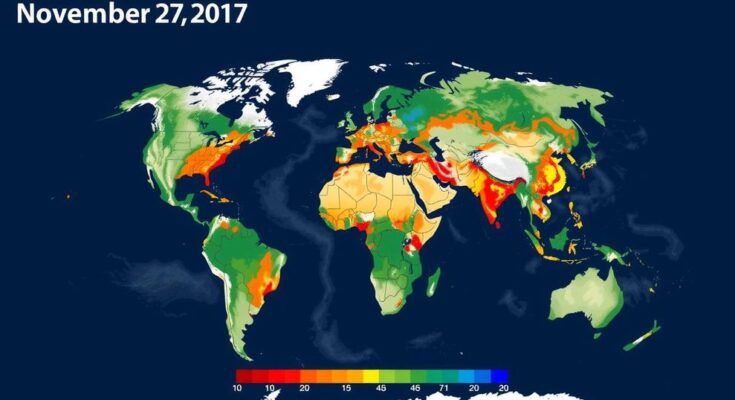From November 21 to November 27, 2024, ENSO-neutral conditions persisted globally, with significant rainfall in Africa and Central America. Heavy rains caused flooding across various countries, while several regions experienced drought due to insufficient rainfall. Impacts on local agriculture and infrastructure necessitate focused management strategies.
Global weather patterns from November 21 to November 27, 2024, indicate that ENSO-neutral conditions are prevailing. Notable weather events include extensive rainfall across several regions in Africa, particularly in Kenya, southern Somalia, and Mozambique. In Central America, Tropical Storm Sara has caused heavy rainfall, leading to severe flooding in various areas including Colombia.
In Africa, regions such as central and eastern Kenya, along with southern Somalia, continue to experience heavy rainfall. The Sudd wetlands in South Sudan remain flooded, although conditions have improved upstream along the White Nile. Northeastern Ethiopia is also facing severe flooding due to considerable rainfall.
Flooding has affected a wide range of countries including Guinea-Bissau, Guinea, northern Sierra Leone, central and southern Mali, Senegal, southern Niger, northern Nigeria, and parts of Chad and Cameroon. However, it is important to note that flooding conditions have significantly improved in Nigeria.
In contrast, Ghana, central Togo, central Benin, and areas in western Nigeria are grappling with abnormal dryness because of insufficient rainfall in the preceding months. Other regions, including northern Ghana, eastern Nigeria, and central to eastern Cameroon, are similarly experiencing drought conditions.
Southeastern Ethiopia and central to southern Somalia have faced below-average rainfall, leading to drought scenarios in certain areas. However, recent heavy rainfall in eastern Kenya and southern Somalia has somewhat alleviated these conditions. Forecasts suggest that northwestern Africa and parts of Madagascar will encounter unusually hot temperatures, while heavy rainfall could trigger flash floods in Angola. In the Ituri province of northeastern DR Congo, excessive rain and subsequent flooding have been reported due to Lake Albert’s overflow since early November.
The analysis covers significant weather phenomena occurring globally, focusing particularly on African nations and select areas of Central America. Understanding these weather patterns is critical for disaster preparedness and response efforts, as they can drastically impact agriculture, infrastructure, and overall human welfare. Regions adversely affected by extreme weather events often face humanitarian crises, necessitating prompt interventions from national and international organizations.
In conclusion, the week from November 21 to November 27, 2024, showcased a variety of weather-related challenges across Africa and Central America. While some regions experienced heavy rainfall and flooding, others are dealing with drought conditions due to poor rainfall distribution. Safe and effective disaster management strategies are essential in mitigating the impacts of these weather hazards.
Original Source: reliefweb.int




